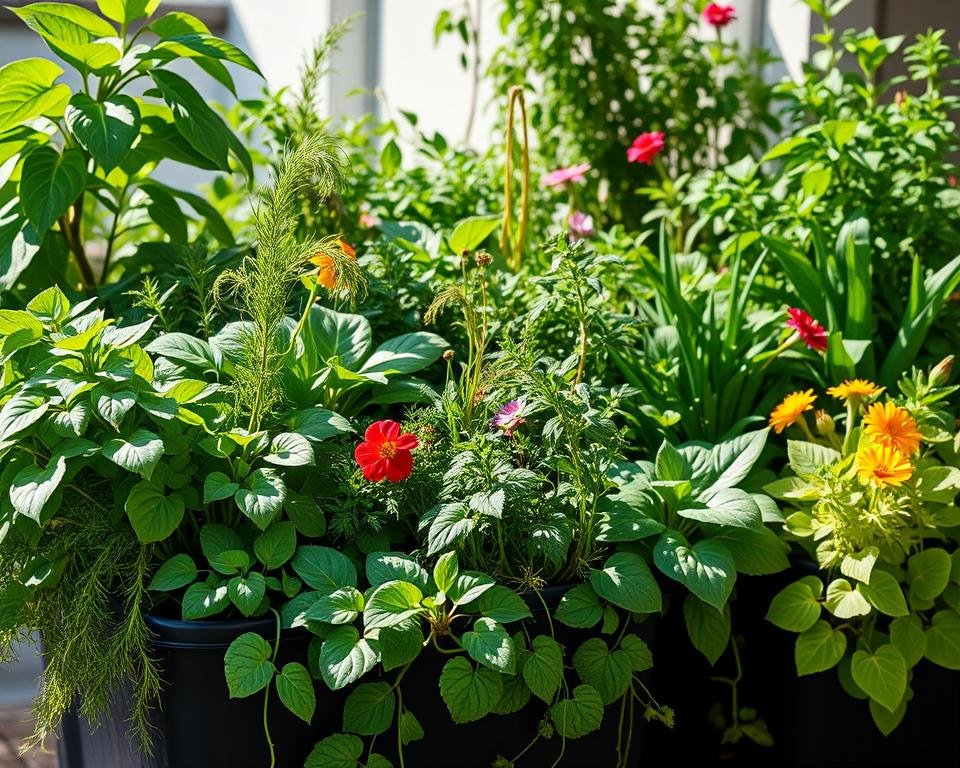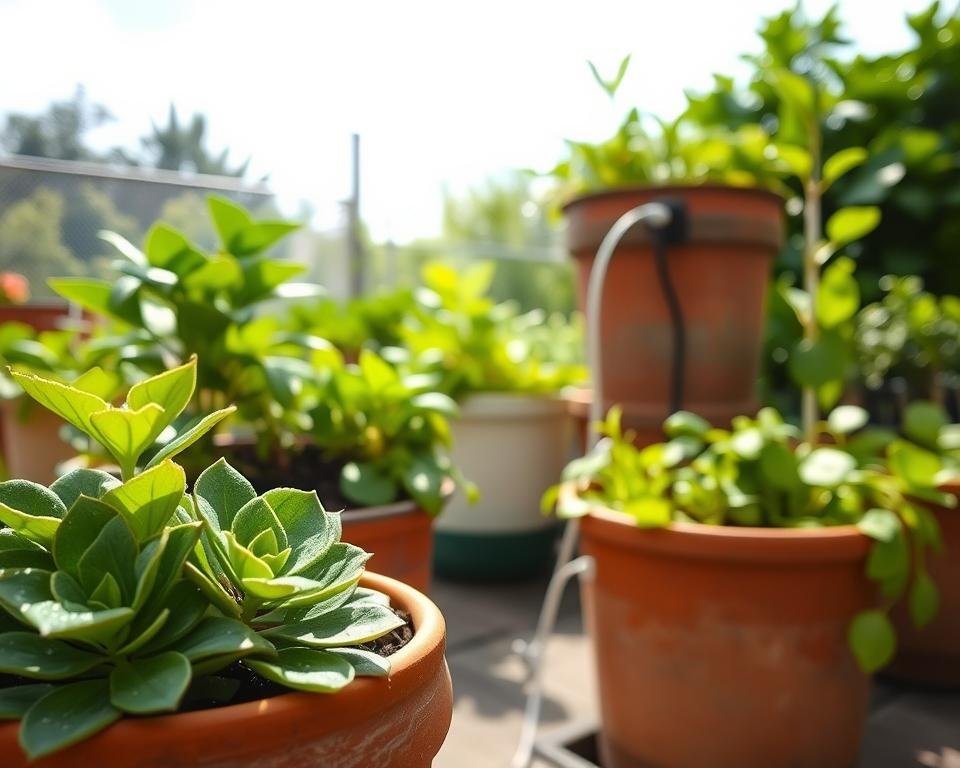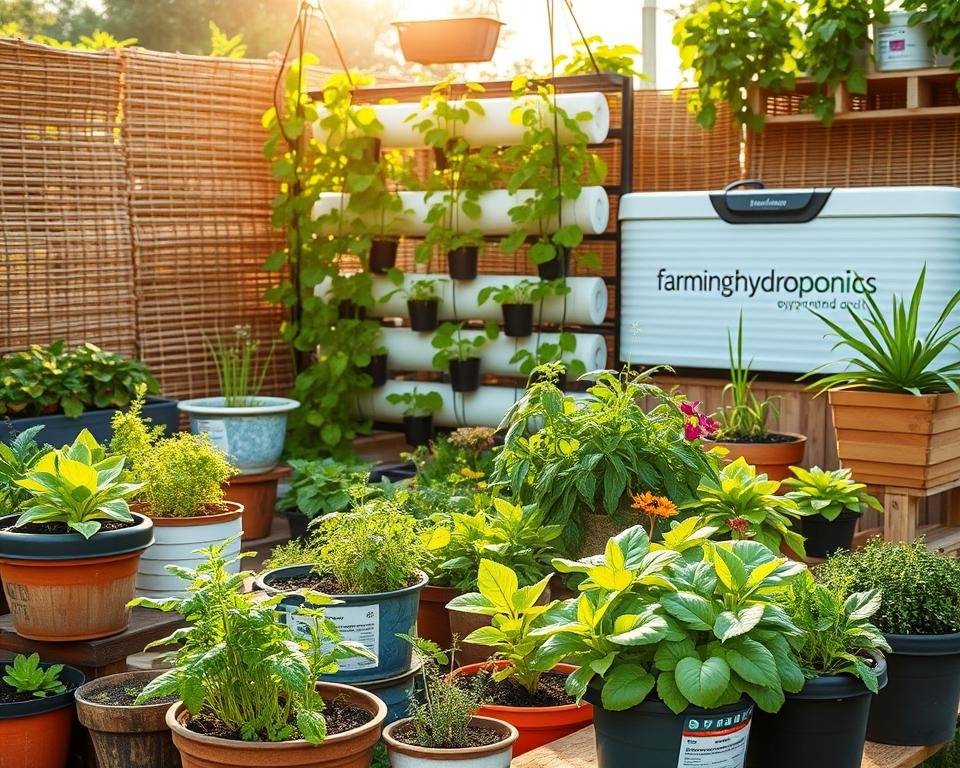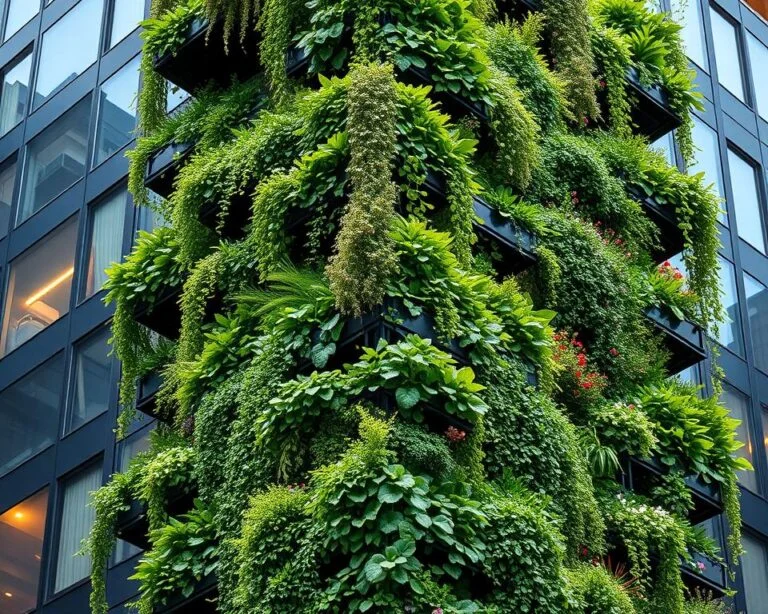Sustainable Gardening Practices in Container Garden
Imagine turning your small urban space into a lush, eco-friendly garden. This garden not only feeds you but also helps the planet. Container gardening has been around for over 3,500 years. Today, it’s a key part of sustainable gardening practices, offering a way to live more responsibly in tight spaces.
Starting your sustainable gardening journey is easy. You just need a few pots and a commitment to green living. Container-gardening lets city folks grow their own food, cut down on carbon, and make a personal green oasis.
Even with a tiny balcony or small patio, you can grow a lot of food. Studies show a 4×5 ft balcony garden can produce almost 100 pounds of food in one season. This proves that even the smallest spaces can be mighty when rooted in sustainable gardening practices.
Key Takeaways
- Container-gardening can transform small urban spaces into productive ecosystems
- Sustainable practices reduce environmental impact
- Even small gardens can produce significant food yields
- Native plants require less maintenance and water
- Eco-friendly gardening contributes to carbon reduction
Understanding Container Gardening Fundamentals
Urban-gardening has changed how city folks grow their own food. Container-gardening is a great way to use small spaces. It turns balconies, patios, and tiny areas into green spots.
Benefits of Container Growing
Container gardening is super flexible for those who love sustainability. You can grow plants almost anywhere with the right setup. The main benefits are:
- Portability of garden spaces
- Precise control over soil health
- Ability to move plants for optimal sunlight
- Protection from ground pests and soil-borne diseases
Essential Equipment and Materials
For a successful garden, you need good planning and tools. Here are the key things for your container garden:
| Equipment | Recommended Specifications |
|---|---|
| Container Size | 5-gallon for large vegetables, 3-gallon for smaller plants |
| Soil Mix | Soilless potting mix with excellent drainage |
| Drainage | 4-6 holes per container (1/4-inch size) |
| Fertilizer | Slow-release at season start, liquid fertilizer bi-monthly |
Space Planning and Light Requirements
To make the most of your garden, know about light and space. Sunlight is key for plants to grow. Most fruiting plants need 6-8 hours of sunlight. Leafy greens can do well with 3-5 hours.
Where you place your garden matters a lot. Use vertical setups, tiered planters, and smart spots to make small areas green and productive.
Sustainable Gardening Practices for Urban Spaces

Urban gardening turns small areas into lively ecosystems. Your container garden can help the environment, even in tight city spots.
Permaculture brings new ideas to gardening. It helps you make your garden strong and full of life. This supports local wildlife and cuts down on harm to the environment.
- Use native plants to help local wildlife
- Try integrated pest management
- Make homes for good insects
- Save water in your garden
Native plants are key in urban gardening. They need 50% less water than other plants. They also draw 50% more pollinators, making the area healthier.
| Sustainable Practice | Environmental Impact |
|---|---|
| Native Plant Integration | 60% Increased Local Biodiversity |
| Integrated Pest Management | 50% Reduced Pesticide Use |
| Water Conservation Methods | 30% Reduced Water Usage |
Integrated pest management is a way to keep your garden healthy without chemicals. It uses natural helpers and planting friends to protect your plants and help local animals.
Your urban container garden can be a big help for the environment. With careful planning and green practices, even the smallest areas can make a big difference.
Soil Health and Natural Fertilizers
Starting a thriving container garden begins with soil health. Your plants need a rich, nutrient-rich environment for growth. By using sustainable agriculture practices, you can make your garden a vibrant ecosystem.
Creating Organic Potting Mix
An excellent organic potting mix is key for container gardening. Here are the main ingredients for a nutrient-rich mix:
- Compost as a primary base ingredient
- Perlite for better drainage
- Coconut coir for water retention
- Organic worm castings for extra nutrients
Composting for Container Gardens
Composting turns kitchen scraps and garden waste into black gold for your plants. Urban gardeners can use Bokashi, a compact composting method, in small spaces. Studies show mycorrhizal fungi can boost plant yields by up to 40% in compost.
Natural Fertilizer Options
Enhance your container garden’s soil with these natural fertilizers:
- Compost tea: A liquid nutrient boost
- Vermicompost: Nutrient-rich worm castings
- Seaweed extract: Mineral-rich plant enhancer
- Fish emulsion: Nitrogen-packed organic fertilizer
By focusing on organic practices and natural soil amendments, you’ll have a sustainable container garden. It will thrive with little environmental harm.
Plant Selection and Companion Planting Strategies

To make the most of your urban garden, choose plants wisely and use smart planting strategies. Knowing how plants interact helps your garden grow strong and diverse. This approach supports local wildlife and eco-friendly gardening.
Companion planting is a clever way to use your garden space well. It pairs plants to boost growth, keep pests away, and improve soil health.
- Marigolds emit natural toxins that repel nematodes, making them excellent companions for root crops
- Basil can protect tomato plants by deterring harmful insects like tomato hornworms
- Combining corn, beans, and squash creates a symbiotic relationship that benefits soil health
Native plants are vital for local ecosystems. Choose plants native to your area for your garden. They fit well with local conditions and attract helpful pollinators.
| Plant Combination | Benefits | Pest Control |
|---|---|---|
| Carrots + Onions | Improved growth | Deters carrot flies |
| Tomatoes + Basil | Enhanced flavor | Repels hornworms |
| Lettuce + Sunflowers | Extended growing season | Shade protection |
Good companion planting needs careful planning. Think about each plant’s needs and don’t overcrowd. This avoids competition for resources. Testing your soil and understanding plant relationships are crucial for a successful garden.
The secret to a thriving container garden lies in working with nature, not against it.
Water Conservation and Management

Water conservation is key in container gardening. Urban gardeners can cut down water use with smart methods and planning.
“Adding mulch to the soil surface reduces how much water is evaporated from the soil.” – Dr. Colby Moorberg, Soil Scientist
Your container garden can show how to save water. By using a few important strategies, you can make your garden water-efficient:
- Use drip irrigation systems to minimize water waste
- Select drought-resistant plant varieties
- Implement mulching techniques
- Collect and utilize rainwater
Knowing how much water your garden uses helps you make better choices. Here are some water use insights:
| Water Usage Category | Percentage | Conservation Strategy |
|---|---|---|
| Agriculture | 70% | Drip irrigation |
| Industry | 20% | Closed-loop systems |
| Domestic | 10% | Efficient fixtures |
Using water-saving practices can save you over $380 a year on water bills. Mulch can cut down soil evaporation by half. Drip irrigation sends water straight to the roots, cutting down on waste.
Smart gardening means grouping plants by water needs and watering when it’s cooler. Watering in the early morning or late evening helps plants absorb more water. This supports your goal of sustainable gardening.
Conclusion
Urban container gardening is a strong way to care for our planet. It turns small areas into green spots that help the environment. By doing this, you can make a big difference and have a personal garden.
This guide shows how to garden organically, even in small spaces. For example, vertical gardening can make plants grow 30% more. Choosing native plants can cut water use by 50%. These steps help your garden and the planet.
By gardening sustainably, you do more than just help yourself. Adding bee hotels and pollinator-friendly plants boosts local wildlife. Community gardens also bring people together, increasing neighborhood spirit by 40%.
Every container, plant, and green practice helps our planet. Begin with a small garden, learn as you go, and watch it grow. Your garden is a symbol of caring for the earth and yourself.







